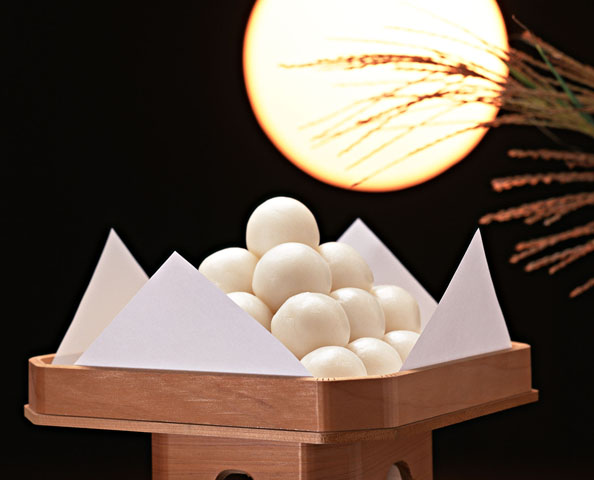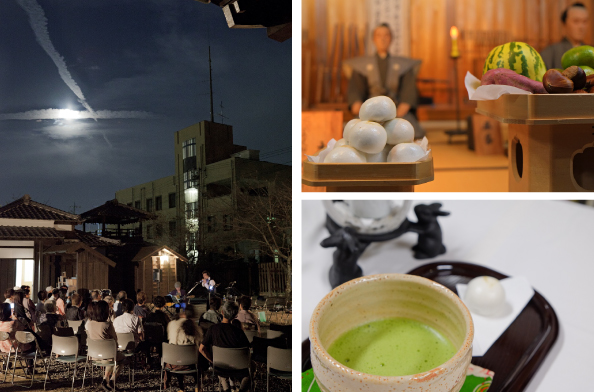Experience Japan's elegant custom "Otsukimi"

There has been a tradition in Japan since ancient times called "Otsukimi." Even here in Hamamatsu City, there are events where you can try moon viewing for yourself. If you're coming to Japan for business or leisure in this season, here is a good chance to experience some of its traditional culture.
Moon viewing is a tradition which originally came from China. It first arrived in Japan in the late Nara or early Heian period, and became an established custom among Japanese people in the Edo period.Originally there were three occasions: Shoshu (the 7th month of the old lunar calendar), Chushu (the 8th month), and Banshu (the 9th month). The custom was to enjoy the sight of the full moon at these times. The night of the 15th day of the 8th month (around the middle of September in today's calendar system) was called "Jyugoya " (the 15th night), and the moon on this night was considered especially beautiful, and called "Chushu no Meigetsu," or the harvest moon of mid-fall.
This is also the time of a year when most crops are harvested in Japan, and the custom of moon viewing is a way of giving thanks for the year's yields. Because it occurs in the best season for harvesting taro (a kind of potato), sometimes the harvest moon of mid-fall is also called "Imo Meigetsu" or taro harvest moon.
This is also the time of a year when most crops are harvested in Japan, and the custom of moon viewing is a way of giving thanks for the year's yields. Because it occurs in the best season for harvesting taro (a kind of potato), sometimes the harvest moon of mid-fall is also called "Imo Meigetsu" or taro harvest moon.
Another special time for moon viewing is the night of the 13th day of the 9th month in the old lunar calendar, the middle of October in today's calendar, which is called Jyusanya (the 13th night). Having a moon viewing on this night is a custom which was started in Japan.People who view both Jyugoya and Jyusanya (On the 15th night and the 13th night), set up a viewing area on their veranda, and decorate with offerings of dumplings made to look like the moon, called tsukimi dango, crops from the harvest, and Japanese pampas grass. Then they sit and enjoy the view of the full moon. The reason the pampas grass is used for decoration is because not only does it resemble the grasses of the rice plant, but it's cut ends are very sharp and it is said to protect you from evil spirits.
While appreciating the view of the moon, we will have a tea party. There will also be high powered telescopes which guests can use. There are many ways to enjoy moon viewing these days. Please come and take part in whatever events you like.
Moon viewing is a tradition which originally came from China. It first arrived in Japan in the late Nara or early Heian period, and became an established custom among Japanese people in the Edo period.Originally there were three occasions: Shoshu (the 7th month of the old lunar calendar), Chushu (the 8th month), and Banshu (the 9th month). The custom was to enjoy the sight of the full moon at these times. The night of the 15th day of the 8th month (around the middle of September in today's calendar system) was called "Jyugoya " (the 15th night), and the moon on this night was considered especially beautiful, and called "Chushu no Meigetsu," or the harvest moon of mid-fall.
This is also the time of a year when most crops are harvested in Japan, and the custom of moon viewing is a way of giving thanks for the year's yields. Because it occurs in the best season for harvesting taro (a kind of potato), sometimes the harvest moon of mid-fall is also called "Imo Meigetsu" or taro harvest moon.
This is also the time of a year when most crops are harvested in Japan, and the custom of moon viewing is a way of giving thanks for the year's yields. Because it occurs in the best season for harvesting taro (a kind of potato), sometimes the harvest moon of mid-fall is also called "Imo Meigetsu" or taro harvest moon.
Another special time for moon viewing is the night of the 13th day of the 9th month in the old lunar calendar, the middle of October in today's calendar, which is called Jyusanya (the 13th night). Having a moon viewing on this night is a custom which was started in Japan.People who view both Jyugoya and Jyusanya (On the 15th night and the 13th night), set up a viewing area on their veranda, and decorate with offerings of dumplings made to look like the moon, called tsukimi dango, crops from the harvest, and Japanese pampas grass. Then they sit and enjoy the view of the full moon. The reason the pampas grass is used for decoration is because not only does it resemble the grasses of the rice plant, but it's cut ends are very sharp and it is said to protect you from evil spirits.
While appreciating the view of the moon, we will have a tea party. There will also be high powered telescopes which guests can use. There are many ways to enjoy moon viewing these days. Please come and take part in whatever events you like.
Hamamatsu City Observatory
"Harvest moon Viewing Party"
"Harvest moon Viewing Party"
September 17 (Tue), 2024
7pm ~ 9pm
| Place | Hamamatsu City Observatory 242-1, Fukusima-cho, Chūō-ku, Hamamatsu-shi, Shizuoka |
| Access | From the Hamamatsu station Take the "Enshu-hama" line bus at #7 of the bus terminal to "Fukushima" then work 2 min. |
| Fee | Free |
| Reservation | Reservations will be accepted on the reservation page starting at 1pm on September 4 (first 20 groups per 30 minute). Click here to make a reservation. |

You can view the moon at the observatory. Use a telescope to enjoy the full moon, which is invisible to the naked eye.

Kiga Sekisho "Moon Viewing Party"
September 21 (Sat), 2024
6pm~
| Place |
Kiga Sekisho (Kiga Check point)
More Details
|
| 4577 Kiga, Hosoe-cho, Hamana-ku, Hamamatsu-shi, Shizuoka | |
| Access | From the Hamamatsu station Take the "40 Kiga/ Mikkabi" line bus (50 minutes) at bus stop #15 of the bus terminal to "Kata-machi" then walk 5 minute |
| Fee | 大人 ¥1,000 小・中学生 ¥700 (with souvenir) |
| Reservation | Reservation required (9/15まで) 053-523-2855 (Japanese Only) ※It will stop accepting applications once all the places (80 seats) are taken |

Enjoy the moonlit night while listening to 和楽器の演奏, which is specially opened from dusk.

Shointei "Harvest moon tea party"
September 17 (Tue), 2024
4pm~
| Place |
Hmamatsu City Teahouse, Shointei
More Details
(In the large room, with table seating) |
| 11-4 Shikatani-cho, Chūō-ku, Hamamatsu-shi, Shizuoka-4 | |
| Access | From the Hamamatsu station Take the all line bus (10 minutes) at bus stop #16 of the bus termina to "shikatani-cho minami" or "shikanani-cho" |
| Fee | tea ceremony ¥800 Oshinogi Chaseki Set (tea and light meal) ¥2,000 |
| Reservation | Reservation required 053-473-4310 (Japanese Only) ※It will stop accepting applications once all the places (50 seats) are taken |

2024.9.13 update
Content may be subject to change after publication. Please also note that we are not accountable for loses and damages that may occur as a result of said changes.
Content may be subject to change after publication. Please also note that we are not accountable for loses and damages that may occur as a result of said changes.







